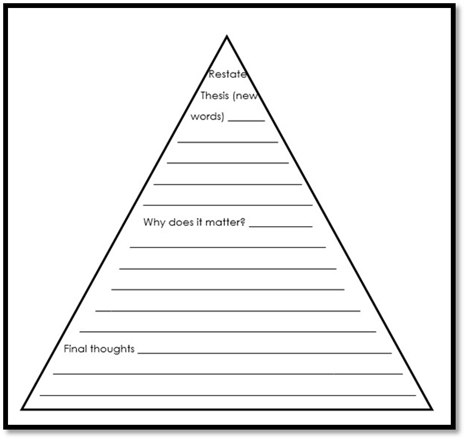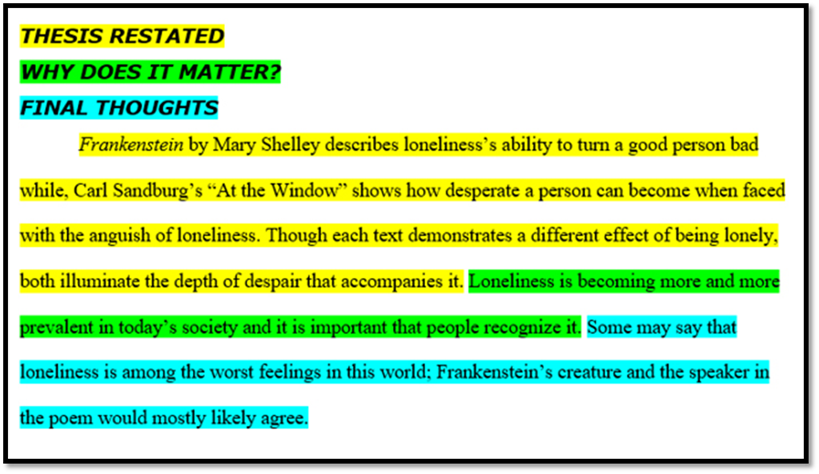Conclusion

Portrait: Helen
of Troy
Unit Overview
In
this unit, you will develop the conclusion for your
Literary Analysis essay.
Click here to download
notes for this unit.
Over the next few units, we will construct a
Literary Analysis essay based on the following prompt.
·
Read and take notes on two poems about Helen of Troy—"
To Helen" by Edgar Allan Poe and "Helen" by H. D. (Hilda
Doolittle).
·
Construct a multi-paragraph response in which you analyze
how the subject of "Helen" is treated differently across the two
texts.
Before we begin, you must read the following
two poems:
"To Helen" by Edgar Allan Poe "Helen" by H. D.
Here are some key vocabulary words from both poems.
ü Nepenthe - a drug or
potion for forgetfulness."
ü Lustrous - shining or
glowing with light
ü Seraphim - an angelic
being
ü Aegis - a shield
or protective armor
ü Radiant - shining or
glowing brightly
ü Elysian - relating
to or resembling paradise
ü Sovereign - having
supreme power or authority
ü Adored - loved and
admired greatly
ü Perfumed - having a
pleasant scent
ü Enthralling - captivating or spellbinding
Remember the outline of the previous unit…
|
Literary Analysis
Essay: Outline |
|
1. Introduction a. Hook b. Background Information c. Thesis (Central Idea) |
|
2. Body Paragraph 1 a. Topic Sentence for Text 1 b. Textual Evidence
i. Explanation c. Textual Evidence
i. Explanation d. Textual Evidence
i. Explanation e. Wrap-Up Topic 1 |
|
3. Body Paragraph 2 a. Topic Sentence for Text 2 b. Textual Evidence
i. Explanation c. Textual Evidence
i. Explanation d. Textual Evidence
i. Explanation e. Wrap-Up Topic 2 |
|
4. Conclusion a. Restate the thesis in a different way
(central idea) b. Why does it matter? c. Final Thoughts |
We will be finishing that outline during this unit.
Conclusion
In a literary analysis essay, the conclusion
is your chance to leave a lasting impression on the reader. It is the essay's
final paragraph. It should tie together all the threads of your analysis and
offer a final, thought-provoking comment that engages the reader's mind and
emotions.
·
A weak conclusion might summarize the main points of your essay
without offering any new insights or leaving a lasting impression on the
reader.
·
A strong conclusion, on the other hand, should restate your
thesis in a new way, summarize the main points of your analysis, and offer a
final, thought-provoking comment that engages the reader's mind and emotions.
To write a strong conclusion, you should
consider the specific work of literature being analyzed and the ideas and
themes that have emerged in your essay. It would help if you also experimented
with different conclusions, such as a rhetorical question, a call to action, a
metaphor, a quotation, or a personal anecdote until you find the one that best
captures the essence of your analysis and leaves a lasting impression on the
reader.
Remember, the conclusion is the last thing the
reader will see, so making it memorable and impactful is important. Take the
time to revise and refine your conclusion as you revise your essay, and feel
free to experiment with different phrasings, structures, and tones until you
find the one that works best for you. With practice and feedback, you can learn
to write powerful and persuasive conclusions that leave a lasting impression on
your readers.
Key Points
The conclusion is the
paragraph that brings a speech, essay, report, or book to a satisfying and
logical end. It is also called the concluding paragraph or closing.
The conclusion will contain the following:
1) Restate the thesis from your introduction in new words.
a. If you copy and paste
the exact thesis, you will sound like a robot.
b. Use new words to state
the same idea.
c. One successful formula
for this: When one considers (body #1 topic) and (body #2 topic), it's clear
that...
2) Why does it matter?
a. Leave behind the
novel/topic/issue
b. Explain the bigger
reason why the reader should care.
3) Final thoughts
a. The last sentence
should leave the reader nodding in agreement and feeling happy that they
bothered to read your essay.
b. If stuck? Use a hook
strategy.
You can think of your conclusion as a triangle.
It starts very specific and becomes more and more general.

Model
Outline
Restate Thesis: Frankenstein by Mary Shelley describes loneliness's
ability to turn a good person bad. At the same time, Carl Sandburg's "At
the Window" shows how desperate a person can become when faced with loneliness.
Though each text demonstrates a different effect of loneliness, both illuminate
the depth of despair accompanying it.
Why does it matter? Loneliness is becoming increasingly
prevalent today, and people must recognize it.
Final Thoughts: Some may say that
loneliness is among the worst feelings in this world; Frankenstein's creature
and the speaker in the poem would most likely agree.

It's Your Turn
Now develop your conclusion outline!
(you already have
your introduction and body paragraphs from Units
12 and 13)
Prompt: Read and take notes on two poems about
Helen of Troy—" To Helen" by Edgar Allan Poe and "Helen" by
H. D. (Hilda Doolittle). Construct a multi-paragraph response in which you
analyze how the subject of "Helen" is treated differently across the
two texts.
Restate thesis (in new words):
__________________________
Why does it matter? _______________________________
Final Thoughts: ___________________________________
You can print out this graphic organizer to
help you.
Congratulations! You
have finished outlining your Literary Analysis essay.